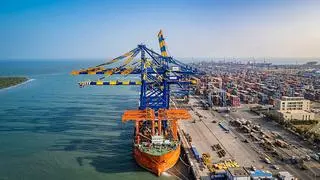The enormous success of container freight station in decongesting domestic ports is an example worth emulating by the air cargo industry in the form of air freight stations.
The concept of AFS or off-airport cargo processing facility is not new to the country.
It was introduced in Chennai in 2007 to decongest the air cargo terminal. While, AFS has been proved as a successful model globally, it is non-starter in India.
The first AFS at CWC Virugambakkam in Chennai did not take off due to opposition from the airport operator on the ground that they will lose revenue from storage and handling, if the cargo is moved to an off-airport location. Incidentally, the Mumbai Customs a few days ago gave permission to start a AFS in CWC Mulund.
The working group, set up by the Ministry of Civil Aviation to look in to the air cargo logistics industry, wants the government to give a lot of thrust on developing AFSs. One of the major recommendations was to remove barriers in operating AFSs.
concept similar to cfs
The concept of AFS is similar to that of CFS. After the arrival, all containers (other than select category of green channel) from the port are compulsorily moved to an off-dock CFS from where customers take delivery of cargo. This has decongested the ports to a great extent. In fact, Chennai port's container operation is heavily dependent on around 30 CFS located in the city outskirts.
A CFS is a common user facility with public authority status. They are equipped with fixed installations and offer services for handling and temporary storage of import/export laden containers carried under customs transit by any applicable mode of transport. Similarly, all cargo after landing can be moved to an off-airport AFS from where customers can take delivery of their cargo. This will decongest airports to a great extent.
“We failed to take advantage of AFS,” said Mr G. Raghu Shankar, a member of the working group representing the Air Cargo Agents Association of India. “At our airports, there is a space constraint, and shortage of equipment and manpower. This has led to congestion at air cargo terminal. An AFS can solve all these problems, will provide better utilisation of resources and enhance turnaround time”, he said.
air cargo processing
Traditionally, almost all activities related to air cargo processing, including weighing, screening and Customs examination have been done at the cargo terminals in the airport area.
With the growth of cargo volume, the current space at most cargo terminals in country is proving woefully inadequate, leading to severe congestion issues. The concept of AFS was conceived as a means to reduce congestion in the airport premises by permitting transfer of cargo to designate/customs notified freight Stations - AFS or ICDs through bonded trucking operations.
This will facilitate greater throughput efficiency, reduce dwell time, and maximise the utilisation of installed capacity.
A member of the group representing Airports Authority of India was of the view that establishing AFS will reduce burden on air cargo terminals but it will add to increase in dwell time as there are additional steps in shifting cargo to AFS.
These additional steps according to him are ‘filing documents with Customs for approval, shifting import ULD (unit load device or small boxes with piece meal cargo)/individual packages to truck dock area, loading of ULDs and individual packages of import cargo in trucks, bonding trucking from airport to AFS, documentation with customs and cargo custodian, offloading cargo from bonded trucks under customs of supervision and de-stuffing of cargo after tallying with documents.
Airport cargo development is an integrated service for an airline and trade partners. Delinking its core business will only lead to increased dwell time and risk to the entire supply chain and additional cost on account of AFS will be loaded on clearance alone, hence the overall cost will increase.
Mr A.V. Vijaykumar, President, Chennai Custom House Agents Association, however, feels feel that though initially these teething problems may be there, in a system driven and automated atmosphere, other than physical handling, rest can be tackled in a time bound manner.
In any case, the average dwell time to clear the cargo for import is 48-72 hr and if AFS is able to offer a timely service with competing charges, the option creates competition for better efficiency - be it the airport terminal or the AFS. Today the option is denied.
Remove barriers
It is important to ensure that barriers to operationalisation of AFS are removed so that those who want to make use of the facility are not denied that option particularly when there are issues being faced by the users as brought out repeatedly, the group said in its observation.
Barriers regarding operationalising AFS should be removed without any further delay.
It is vital that the concerned regulatory clearances are issued by the Customs and the Bureau of Civil Aviation Security and others permitting the bonded movement of cargo to and from the off-airport terminal.







Comments
Comments have to be in English, and in full sentences. They cannot be abusive or personal. Please abide by our community guidelines for posting your comments.
We have migrated to a new commenting platform. If you are already a registered user of TheHindu Businessline and logged in, you may continue to engage with our articles. If you do not have an account please register and login to post comments. Users can access their older comments by logging into their accounts on Vuukle.